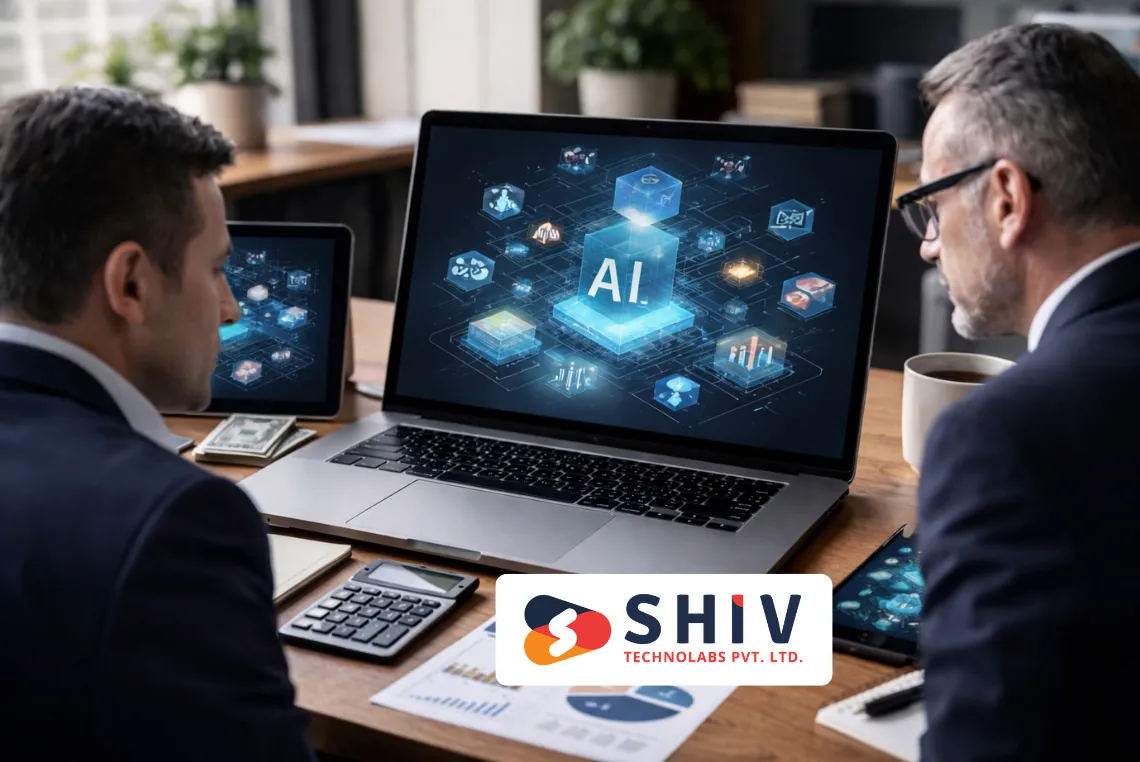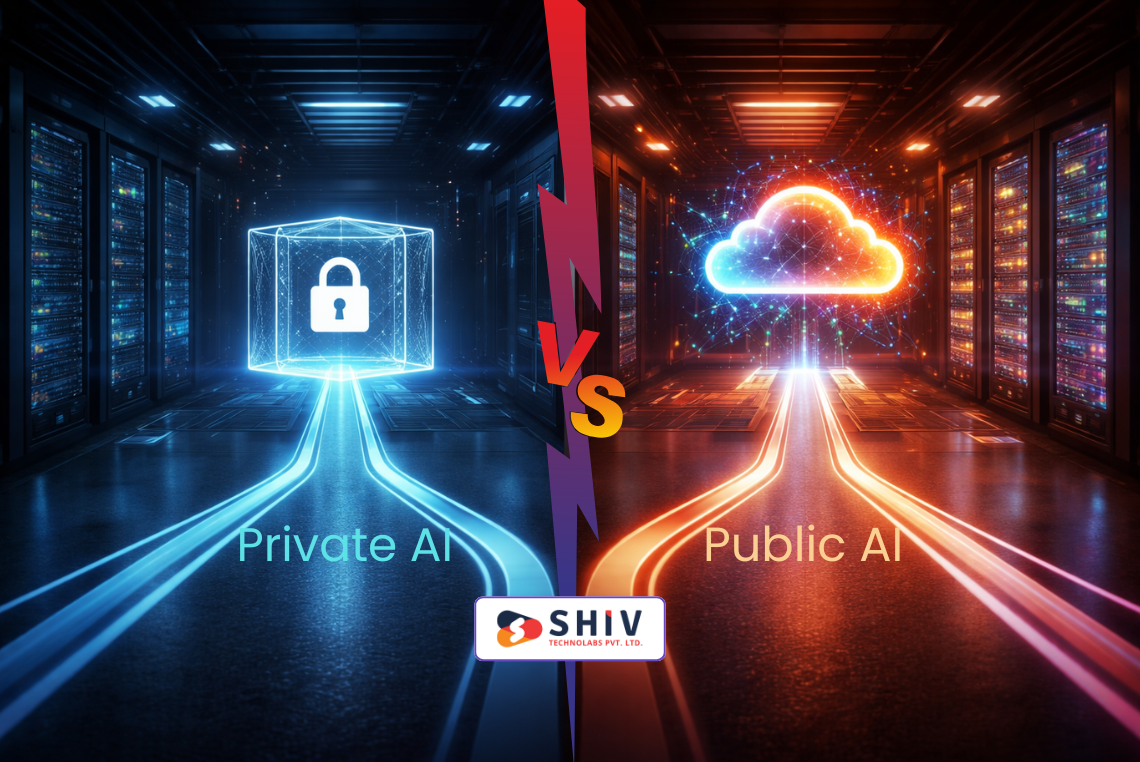Table of Contents
Will AI agents change logistics and supply chain operations worldwide? This question represents a significant change occurring in the transportation, warehousing, procurement, and distribution networks. Nowadays, businesses are turning to AI agent development services to convert manual systems into self-adjusting, smart systems capable of making real-time decisions.
AI Agents in Logistics can handle routing and shipment tracking, automate warehouse operations, predict demand, and minimize operational bottlenecks. With these Logistics Automation Solutions, companies abandon traditional, rule-based workflows for predictive, adaptive, and automated logistics.
The need for AI automation is growing rapidly. Research indicates that the global AI in logistics market is expected to grow by 46% by 2033, driven by the high adoption of predictive technology in freight, warehousing, and fleet management.
AI Agents in Logistics have become digital brains driving supply chains to be faster, more precise, and more resilient.
This article covers what they accomplish, how they accomplish it, their advantages, the implementation process, the value of custom development, future trends, and how companies can select the appropriate partner to implement powerful Logistics Automation Solutions.
What Are AI Agents and How Do They Work in Logistics?
Artificial intelligence (AI) agents are computer applications that monitor information, make predictions, and make decisions and act. They are virtual operators in the logistics which constantly track routes, inventory, fleet performance, and warehouse conditions. They can automate tasks that previously required a human due to their intelligence. For complex planning and forecasting, many teams pair agents with Predictive AI Development and Custom AI Development.
AI Agents in Logistics are digital assistants that work as an interconnected network, monitoring real-time situations and acting on the spot. They are influencing the future of logistics, where there is no compromise on accuracy and speed.
Understanding AI Agents in a Logistics Context
AI agents serve as self-reliant digital decision makers. They work with sensor data, GPS data, ERP system data, WMS system data, CRM system data, transportation feed data, and even third-party sources (weather or traffic).
The AI agents in logistics typically act in the following places:
- Dispatch planning
- Warehouse flow management
- Inventory monitoring
- Fleet routing
- Delivery tracking
- Maintenance prediction
They are also 24/7 and do not get fatigued during performance making them useful in high-volume operations.
Types of AI Agents Used in Supply Chain Systems
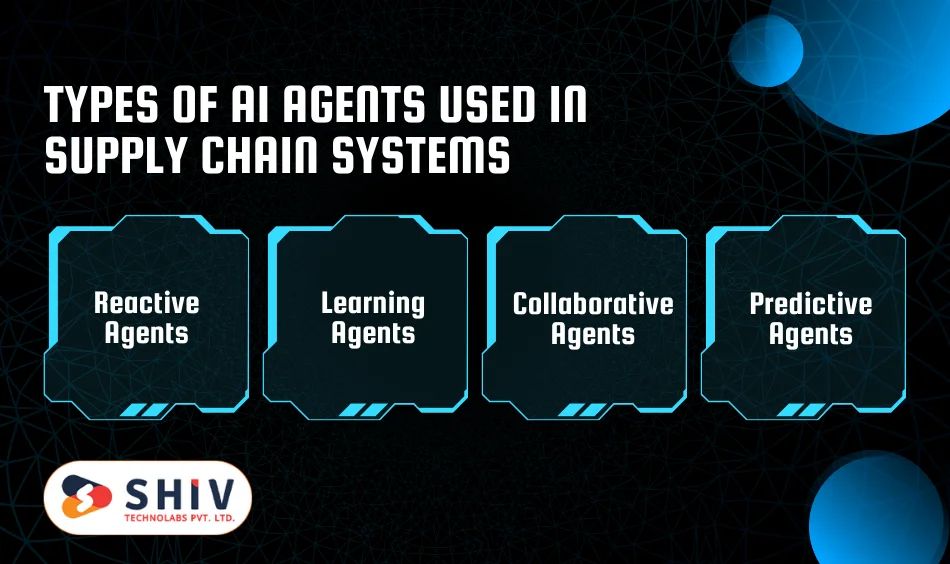
Four major categories of AI agents support smart logistics.
Reactive Agents
They react on a real-time basis. For example, if traffic decreases, a reactive agent will reroute the vehicle.
Learning Agents
They enhance decision-making through machine learning algorithms trained on historical trends and patterns.
Collaborative Agents
These agents integrate information and choices between systems (i.e., TMS, WMS, ERP and CRM).
Predictive Agents
They forecast demand, estimate shipment delays, and predict equipment breakdowns through statistical modelling. Each use case requires different agents, and most enterprise logistics platforms use a combination of all four.
Core Functions Performed by AI Agents in Logistics
Some of the important operational areas that are undertaken by AI Agents in Logistics include:
- Route sequencing and load optimisation.
- Anticipatory maintenance scheduling.
- Inventory notifications
- Real-time tracking and tracing.
- Optimisation of warehouse paths.
- Predicting supply and demand.
- Surveillance of the environmental conditions.
The functions contribute to companies operating at optimal performance and reduce the rate of human error.
How AI Agents Make Decisions in Real Time
The AI agents are based on the algorithms that examine:
- Real-time sensor data
- Past records of performance.
- Behaviour patterns
- Live traffic and live weather feeds. (see: AI in Traffic Management)
- Fleet movement
- Customer orders
These data points are interpreted and the option of action, which suits the operational goals, is selected. An example is that they choose the quickest path, stock level in the warehouse, or redirect a truck immediately a breakdown takes place.
Why AI Agents Are Essential for Modern Logistics
The contemporary supply chain is subject to volatility, demand fluctuations, and unforeseen disruptions. Artificial intelligence agents are more responsive and precise than human teams, particularly during peak seasons or unforeseen situations.
They enable:
- Faster operations
- Reduced bottlenecks
- Higher shipment accuracy
- More efficient utilization of fleet.
- Increased productivity in the warehouse.
They are emerging as the powerhouse of the Logistics Automation Solutions since constant intelligence is vital in remaining competitive in the international markets.
What Are the Benefits of AI Agent Deployment in Supply Chain Logistics?
The implementation of AI agents in logistics companies leads to significant improvements in their operations. The advantages of using AI agents in supply chain logistics include reduced costs, improved accuracy, accelerated workflows, and enhanced understanding. These systems transform old supply chains into dynamic, self-adjusting networks.
Increased Speed and Operational Efficiency
AI agents save a lot of time in processing time at every stage of logistics.
They:
- Shorten dispatch planning
- Quicken order fulfilment.
- Speed up warehouse picking
- Minimize manual steps
- Enhance the time of delivery.
This helps logistics firms handle increased workloads without increasing manpower.
Cost Reduction Across Transportation and Warehousing
AI routing conserves fuel, reduces labour time and fleet health expenses. Predictive maintenance reduces losses associated with breakdown. Picking is automated so that warehouse labour costs are minimized. Cost benefits include:
- Lower fuel and mileage costs.
- Less workforce demands.
- Less downtime
- Fewer returns as a result of error-free handling.
The savings can accumulate quickly, particularly in large fleets.
Real Time Visibility and Transparency
Artificial intelligence agents integrate multi-point data on a single dashboard.
Firms are able to have complete visibility of:
- Shipment locations
- Inventory status
- Warehouse movement
- Fleet behaviour
- Expected delivery times
This increases team trust, customer trust and carrier partner trust.
Predictive Demand and Inventory Planning
Planning is essential to logistics efficiency. The AI agents use past and present data to predict:
- Demand spikes
- Seasonal patterns
- Production needs
- Overstock situations
- Stockout risks
Excessive storage costs and shortages can be eliminated by allocating inventory more accurately.
Enhanced Supply Chain Resilience
The agents of AI respond immediately to disturbances, reducing losses from sudden events.
They assist in the survival of supply chains:
- Traffic congestion
- Weather issues
- Port delays
- Equipment breakdowns
- Demand surges
This enhances the stability and reliability of the logistics operations.
Also Read: AI/ML Model Integration – The Complete Guide by Shiv Technolabs
How to Implement AI Agents in Supply Chain Operations Successfully?
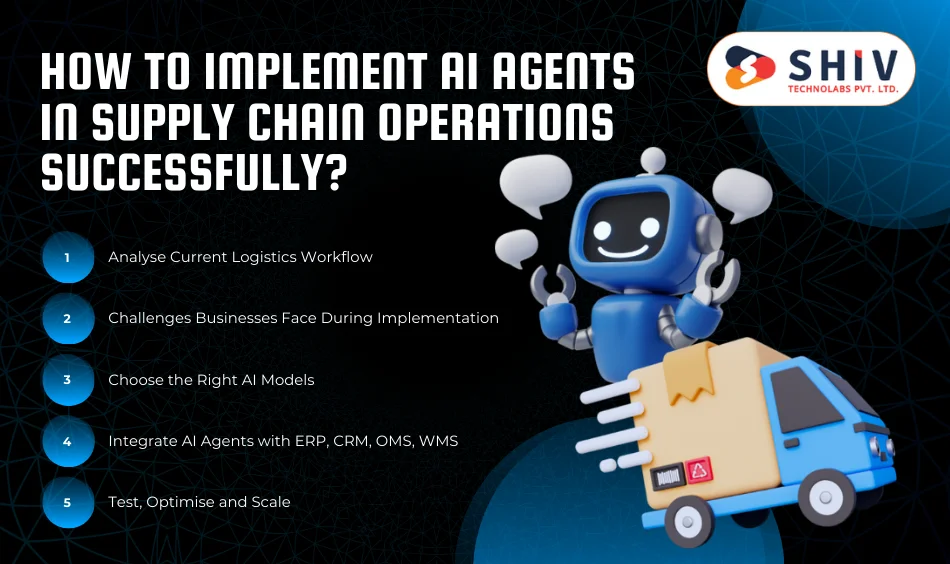
To achieve successful AI integration, a plan is necessary. The process entails the system analysis, model selection, integration, testing, optimisation, and deployment. Knowledge of how to integrate AI agents into supply chain activities will enable the initiative to generate quantifiable ROI.
Step 1: Analyse Current Logistics Workflow
This step plots the current routes, warehouse operations, delivery plans, inventory operations and communication. Companies must identify:
- Manual bottlenecks
- Employee pain points
- Delays and error sources
- High cost segments
The correct analysis will enable AI agents to identify actual issues, not surface-level ones.
Step 2: Challenges Businesses Face During Implementation
The issues in the implementation of AI include:
- Poor data quality
- Legacy system complexity
- Resistance to adoption by employees.
- High upfront cost
Here is the summary table:
| Challenge | AI Agent Solution |
|---|---|
| Poor or inconsistent data | AI based data cleaning and transformation |
| Legacy systems with no APIs | Flexible connectors and modular AI architecture |
| Fear of job loss | Training teams to supervise AI decision making |
| High initial cost | Phased deployment starting with smaller modules |
The development company with a strong AI will provide the success and a successful transition in the long term.
Step 3: Choose the Right AI Models
The kind of intelligence demanded in various functions varies. The efficiency is ensured through the selection of the right models. Types of models:
- Demand scoring machine learning classifiers.
- Forecasting neural networks.
- Routing learning through reinforcements.
- Safety alert rule based logic.
Selecting the appropriate model will make your AI agents act more intelligently.
Step 4: Integrate AI Agents with ERP, CRM, OMS, WMS
The core of AI implementation is integration. To be intelligent, AI agents require information about various systems.
They sync with:
- ERP for billing and orders
- CRM for customer updates
- OMS for order flow
- Warehouse warehouse activities WMS.
- TMS for fleet movement
The more information AI has, the smarter it becomes.
Step 5: Test, Optimise and Scale
Testing provides accuracy, stability and performance.
Simulations include:
- Uncertain demand
- Sudden weather change
- Vehicle breakdown
- Warehouse overloading
Dependable agents can be expanded to other departments, regions, and fleets.
What Is the Role of Custom AI Agent Development for Logistics Companies?
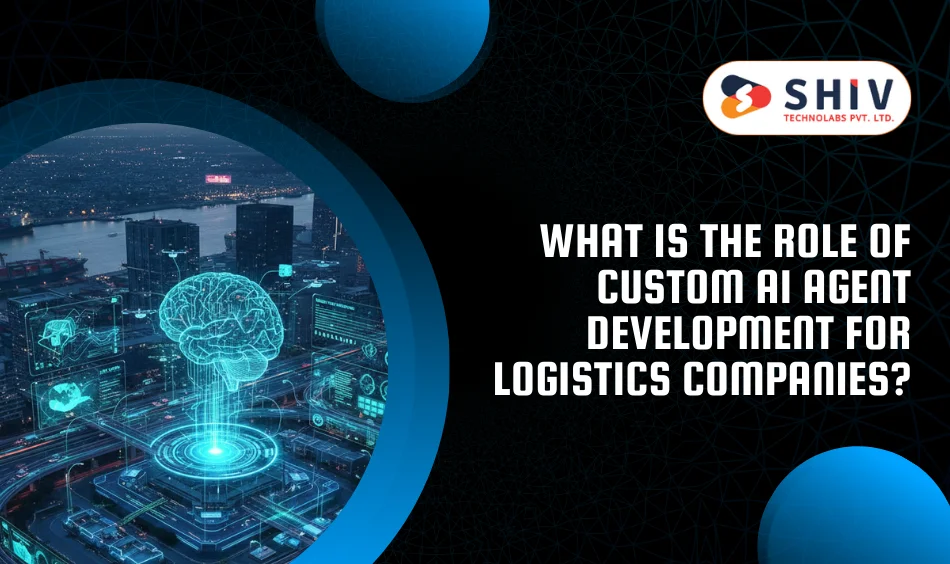
Custom development places logistics companies in a better position since generic AI tools are incapable of comprehending the intricacies of the freight networks, warehouse behaviour, and inventory trends.
Why Logistics Companies Need Tailored AI Agents
Processes of every logistics company are different. Perfect alignment cannot be attained by standard solutions. Custom AI agents adapt to:
- Special cargo requirements
- Custom warehouse workflows
- Special delivery limitations.
- Company-specific KPIs
Individual growth brings about improved results.
Integration Benefits of Custom AI Agents
Custom agents are suitable with:
- ERP database
- Legacy WMS
- Proprietary transport apps
- Custom dashboards
This will prevent replacement costs and minimize integration friction.
Scalability and Future Expansion
CASA AI agents expand as the company grows. They scale when:
- New distribution hubs open
- Fleet size increases
- Delivery regions expand
- Product lines grow
This scalability is in the long run generating ROI.
KPI Focused Performance Monitoring
Custom agents can be configured to tune to a company’s performance indicators.
Examples:
- Cost per shipment
- The success percentage of its delivery.
- Fleet utilisation
- Warehouse throughput
Personal AI assists in monitoring and enhancing the key indicators.
Real-Time Adaptability for Logistics Constraints
The processes of logistics are dynamic. Custom agents adapt immediately to:
- Demand surges
- Vehicle breakdowns
- Sudden weather conditions
- Delivery route changes
Such flexibility provides stability in volatile markets.
How AI Agents Improve Supply Chain Transparency and Decision Making?
The transparency generated by AI agents is through gathering, interpreting and sharing real time information throughout the supply chain. The direct benefits of this visibility are improved decisions, less uncertainty and quick response to the operations.
Real Time Monitoring Across All Logistics Nodes
AI monitors:
- Fleet location
- Inventory levels
- Warehouse movement
- Order status
- Supplier activity
Managers also have a complete picture without having to ask manually.
Predictive Analytics for Future Planning
Predictive AI forecasts:
- Upcoming demand
- Risk of delays
- Warehouse congestion
- Vehicle maintenance needs
These understandings enable businesses to be proactive rather than be reactive later.
Automated Exception Handling
AI agents monitor deviant behaviour in real-time and take action.
Examples include:
- Increase in shipment temperature.
- Overloaded routes
- Missing inventory
- Truck slowdown
Agents inform teams or act automatically.
Cross Department Intelligence Sharing
Data is communicated by AI agents across:
- Transport teams
- Warehouse managers
- Procurement units
- Sales and customer support
This gets rid of interdepartmental miscommunication.
Example of AI Based Decision Improvement
For example, an agent with AI identifies the impending demand for perishable goods in a city. It also notifies procurement, revises fleet transportation, initiates cold storage relocation, and alerts the warehouse to increased inbound volume. Such a cycle enhances productivity and minimizes wastage.
Also Read: What Is a Business AI Agent and Why Do Companies Need It?
What Future Trends Will Define AI Agent Adoption in Logistics?
The coming few years will introduce colossal changes in how AI agents operate in logistics. The use of technology will become increasingly autonomous, leading to fully autonomous ecosystems.
Rise of Multi-Agent Systems
Multi-agent networks are used to coordinate at places, vehicles and warehouses. They do something resembling a computer nervous system that controls the whole supply chain.
Self Learning AI Bots
Such bots automatically retrain themselves with live data. They enhance the quality of prediction and routing as well as time-based decision-making.
Fully Autonomous Supply Chain Networks
Minimal human intervention will be in future logistics. AI will manage:
- Routing
- Planning
- Loading
- Sorting
- Exception handling
Firms will just be tracking performance boards.
Edge AI for Vehicles and Drones
The use of AI will be directly applied to trucks, ships, drones, and warehouse robots to enable ultra-fast decision-making without relying on cloud servers.
Adoption Growth Projection
| Year | AI Agent Adoption Rate | Expected ROI Increase |
|---|---|---|
| 2025 | 35% | 18% |
| 2026 | 48% | 24% |
| 2027 | 61% | 30% |
How to Choose the Right Partner for AI Agent Development in Logistics
There is no success in your AI transformation without selecting the appropriate partner. You should have a team with knowledge of logistics, the ability to develop scalable models, strong support, and fair pricing.
Look for Industry Experience
The partner must be a genuine expert in logistics systems, which include:
- TMS
- WMS
- OMS
- ERP integration
- Predictive routing
This would make them know the complexity of the operation.
Test the Scalability of the System
Ensure that their systems will be expandable with your company. A scalable AI platform:
- Manages increased data volumes.
- Supports new regions
- Works with the added fleet
- Expands across warehouses
Scalability ensures your long-term investment.
Ensure Transparent Pricing
Hidden charges incur long-term issues. Select a partner that has clear cost models that comprise:
- Development
- Integration
- Maintenance
- Training
This prevents future budget shortfalls.
Check Support and Post Deployment Services
AI systems must be monitored. Choose a partner who offers:
- 24 by 7 support
- Model retraining
- Performance analysis
- Security patches and updates.
- Quality support guarantees that AI agents work.
When you want to modernise logistics with the help of an AI automation, Shiv Technolabs offers robust solutions in the sphere of developing powerful AI agents that will help companies to maximize efficiency and accuracy. The Shiv Technolabs team provides strategy, custom models, integration, testing, deployment, optimization, and long-term support to AI agent systems that perfectly satisfy your logistics requirements.
Conclusion
Artificial intelligence agents are changing logistics and supply chain processes through faster workflows, smarter decision processes and predictive analytics. These smart systems have transformed routing into warehouse optimisation, helping eliminate delays, cut costs, boost visibility, and develop more resilient operations.
If you are looking for an AI development company, Shiv Technolabs is the best AI agent development company with a team of various AI and tech experts well versed at helping brands with AI implementation, scalable, and aligned with your business objectives.
Our team of ai agent development services experts allows logistics companies to build smart automation. At Shiv Technolabs, our team possesses the essential technical expertise, strong integration skills, and a track record of successful work in the supply chain industry, making it the appropriate choice to transform supply chain operations.
Start smart, and high-performance logistics automation is made easy with Shiv Technolabs.
Frequently Asked Answers
1. What can AI agents do to make logistics firms less costly to operate?
The use of AI agents lowers operational costs by improving route efficiency, reducing fuel consumption, automating labour-intensive warehouse tasks, and forecasting maintenance requirements. These optimisations minimise downtime, reduce resource waste, and eliminate errors that result in costly delays.
2. Are small logistics organizations able to afford the development of AI agents?
Yes. Small businesses can implement AI agents in stages, beginning with the low-cost applications such as shipment tracking or route optimisation. This progressive implementation makes AI cost-effective and scalable as the business grows.
3. What are the key advantages of AI agents use in logistics?
The most important advantages are an expedited shipping process, real-time supply chain visibility, precise demand forecasting, reduced fuel and labor costs, and proactive problem-solving. AI agents reinforce all layers of the logistics processing.
4. What is the time required to install AI agents within a logistics system?
Simple AI agent implementations require four to eight weeks based on the availability of data and the complexity of integration. Further projects involving multi-agent networks or high-level forecasting can take 3 to 6 months.
5. What type of information do the AI agents need in order to automate logistics?
Some of the data used by AI agents include fleet positions, shipment statuses, warehouse movements, order history, environmental factors, customer demand, and stock levels. Accurate data leads to higher data quality and better automation.





